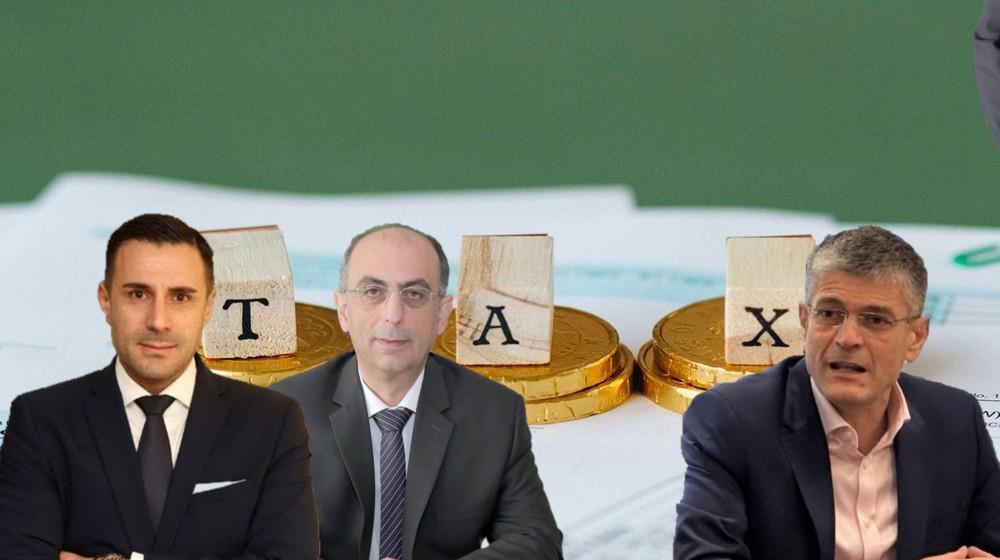The Ministry of Finance and, by extension, the Government seem to be focusing on finding a common language and the greatest possible consensus with the employer organisations, the Cyprus Chamber of Commerce & Industry (CCCI) and Cyprus Employers & Industrialists Federation (OEB), in order to calm the major reactions that are being expressed among the business world regarding provisions in the tax reform bills, which are under public consultation until 10 September.
Indicative of this were the reports of the Minister of Finance last Wednesday (27 August) after the meeting of the Council of Ministers, through which Finance Minister Makis Keravnos made sure to send the message that there is, as he characteristically stated, a very great convergence between them.
"We are talking with the various bodies, such as OEB, CCCI and others, and there is a very large convergence on all issues, therefore I do not understand some of the reactions coming from some bodies," Keravnos said.
It is recalled that before then, and specifically on 19 August, Tax Commissioner Soteris Markides, had a meeting with CCCI, during which, according to the Chamber's announcement, there was a positive response to the concerns that existed and it was agreed that specific proposals and recommendations to the competent authorities would be submitted in the immediate future.
Markides will have a similar meeting today (Monday, 1 September) with OEB, during which the Federation is going to present its views in relation to the provisions of the tax reform bills.
Specifically, the Executive Committee and the Competitiveness Committee of OEB will have a two-hour meeting with the Tax Commissioner - from ten in the morning to twelve noon -, with the subject of discussion, as stated in the relevant OEB announcement, being tax reform and the promotion of positions that enhance the competitiveness of the Cypriot economy.
From OEB's perspective, as InBusinessNews is able to know, the importance attributed to today's meeting is enormous, with the expectation expressed that upon its completion, there will be positive announcements, i.e. the achievement of convergences.
A competent source who spoke to InBusinessNews expressed the assessment that the Ministry of Finance appears to understand and accept in principle the serious concerns of the business world, hence the report by Makis Keravnos after the last session of the Council of Ministers regarding the existence of convergences.
A report that - as he pointed out - was not made by chance, as there had been extensive discussions between the two sides before the Minister of Finance made this specific statement.
"When he says there are convergences, it means that those who hear our concerns understand them as being reasonable and fair, and may even adopt them. Otherwise, what convergences are there?" the same source noted characteristically to InBusinessNews.
It is noted that in view of today's meeting, OEB prepared and sent a specific working document to the Tax Commissioner on the afternoon of 29 August, on which the discussion will take place, which records the problems it identifies, as well as the Federation's suggestions for each of them. "To make the meeting productive and in the hope that we can announce something positive," the same source indicated.
The assessment of the CCCI meeting with Soteris Markides
In his statements to InBusinessNews in the wake of CCCI's meeting with the Tax Commissioner, the Secretary General of the Chamber, Philokypros Roussounides, spoke of an excellent meeting, during which the individual concerns of the business community were raised and "we, as the main exponent of constitutional business, entered into a dialogue with the Tax Commissioner himself."
"An exchange of views took place, specific suggestions were submitted and the written submission of these suggestions follows, both to the Commissioner and to all the competent bodies that will deal with the tax reform, such as the Ministry of Finance, the Presidency, etc., so that some articles that we have agreed need improvement, can be improved and made more understandable, simpler, because one of the goals is for the tax reform to be simplified and understandable and, by extension, attractive," Roussounides said, adding that the positive will of the Tax Commissioner himself was also recorded, so that the agreed changes can be made.
"We are certainly in favour of strengthening tax collection and combating tax evasion, because we always support well-intentioned entrepreneurship," Roussounides pointed out.
At the same time, however, CCCI's Secretary General clarified, "tax reform should not be exclusively a means of collecting revenue, but should be a key tool for stimulating entrepreneurship and attracting investment, as well as a mechanism through which the positive results of fiscal policy will be transferred to citizens."
At the same time, he emphasised, it should also serve to promote environmental and social goals to support vulnerable groups of the population, as well as to implement the green transition.
On the other hand, Roussounides added, it is important to maintain both fiscal stability and the safeguarding of state revenues, beyond the simple implementation of a tax system.
"Some steps have been taken in the right direction in recent years with the implementation of tax for all, which ensures that the treatment of taxpayers is the same for everyone and tax evasion is avoided as much as possible," he continued.
According to the CCCI Secretary General, "when there are such reforms, we should always take into account not only the present, but also the future, due to the fact that the Cypriot economy, with its strong exogenous character and emphasis on services, needs a stable tax system that encourages investment."
Therefore, he indicated, a fair tax system must ensure that each taxpayer pays what is truly due to him, without leaving any room for tax evasion.
"There are issues in the bills that need to be reviewed and some amendments made, and for this reason we will proceed in the coming days with the submission, in writing, of the suggestions we submitted in our meeting with the Tax Commissioner," Roussounides.
What will OEB seek in the meeting with the Tax Commissioner?
On his part, the Director General of OEB, Michael Antoniou, speaking to InBusinessNews, stated that "as a Federation, the first thing we did was to study the bills, to understand and codify their provisions."
As he explained, "we have committees that process them, study them and form positions in principle on the changes that need to be made to the bills."
"We have stated our principles publicly several times. We are ready to modernise the system, but without depriving it of competitiveness or altering the attractiveness of our country's tax system," he added.
At the same time, Antoniou continued, "we are clearly in favour of cracking down on tax evasion and the underground economy, which affects our members and generally all those who apply what is necessary."
According to the Director General of OEB, "on these principles, we processed the bills as much as we could, we prepared a working document, which we sent to the members of OEB committees for further study."
"We had a meeting of the executive committee and the competitiveness committee, during which we finalised our positions, in order to present them to him and discuss them with him at the meeting we will have today with the Tax Commissioner," he emphasised.
Asked about this, Antoniou underlined that "the main goal of our meeting with the Tax Commissioner is to convince him that those things that we believe should be removed from the bills should be removed, those that should be differentiated should be differentiated, and those that should be added should be added."
"This will essentially be our goal. That is, through a dialogue with arguments and examples about the impact it will have on the economy, to achieve what I mentioned above," he said, estimating that "to a significant extent we will succeed, because we are on the same line, to help our country, without having indirect negative side effects."
As Antoniou further pointed out, "whatever remains outside the framework that we consider correct and will be referred to the Council of Ministers, then we will try to convince the Council of Ministers, the President of the Republic, that what remains within the bills, after our efforts with the Tax Commissioner and the Ministry of Finance, must be differentiated as we believe, for the reasons that we will explain with arguments and persuasion."
"And I believe that if there are some issues that we will not convince the Superintendent and the Ministry of Finance, we will probably convince the President of the Republic," he indicated.
At the same time, and after emphasising that the intentions of OEB are clear, he pointed out that "we will try to utilise all the steps that the system with which consultation has operated in Cyprus for so many years allows us, starting from the bottom up."
That is, he explained, first with the competent department/ministry that has further technical ability to understand the side effects in the economy.
"If we fail to convince the department/ministry and provisions with which we disagree remain in the bills, we will try - in all likelihood with the President of the Republic - to convince the Council of Ministers."
"If we are not fully effective even in the Council of Ministers and some issues remain, then we will try to convince Parliament when the bills are put before it," he added.
First of all, Antoniou concluded, "We will exhaust all possibilities with the Ministry of Finance and the Tax Inspectorate to arrive at something that is acceptable, both to us and to them, and I believe that we will succeed to some extent."
(Source: InBusinessNews)









